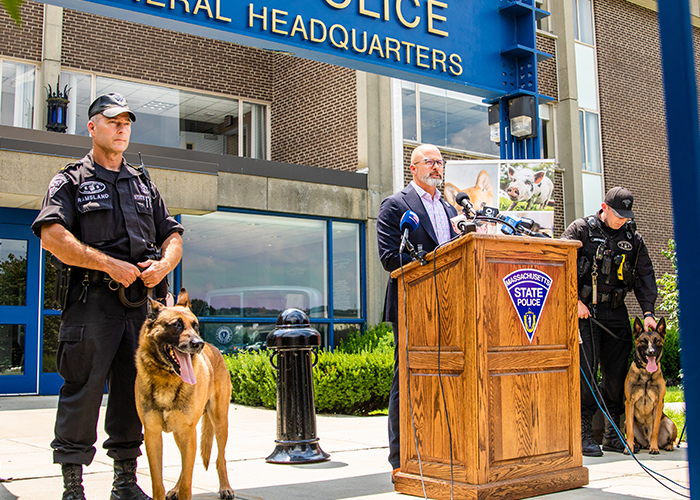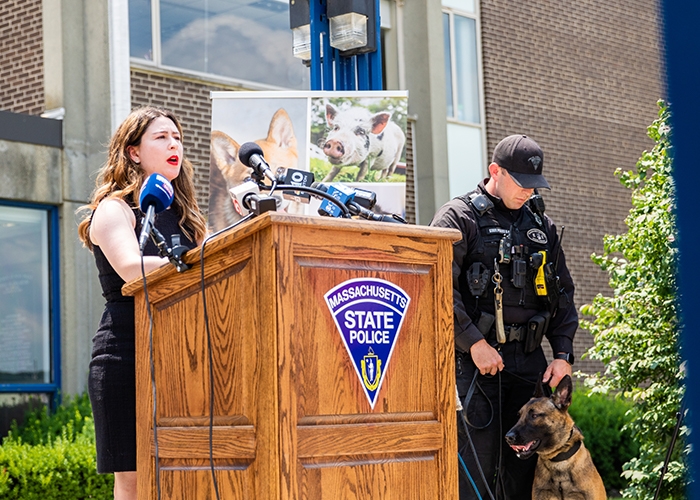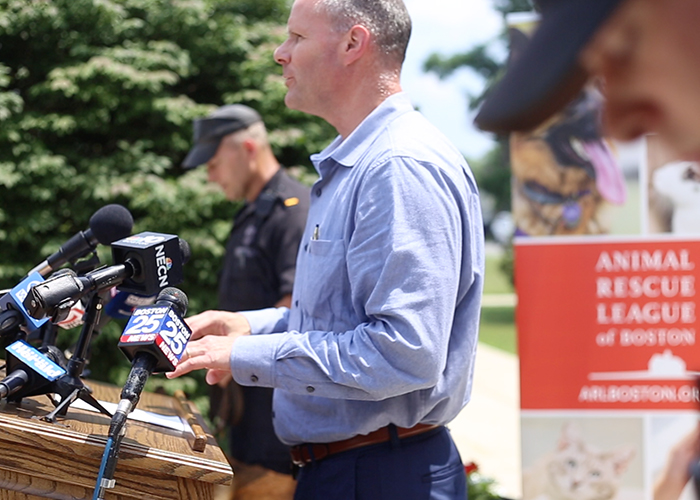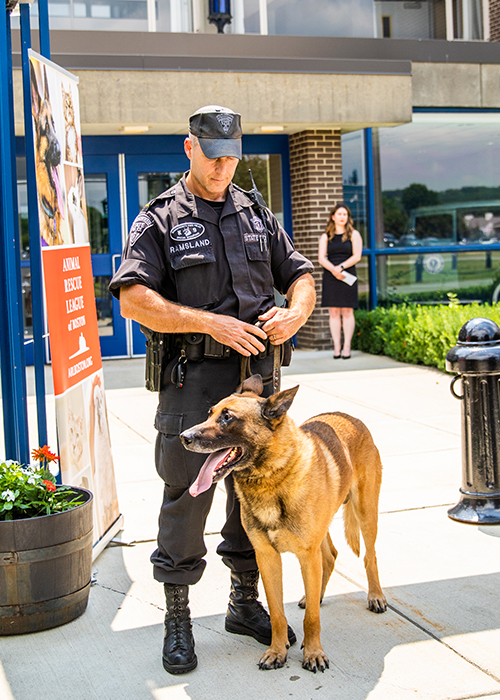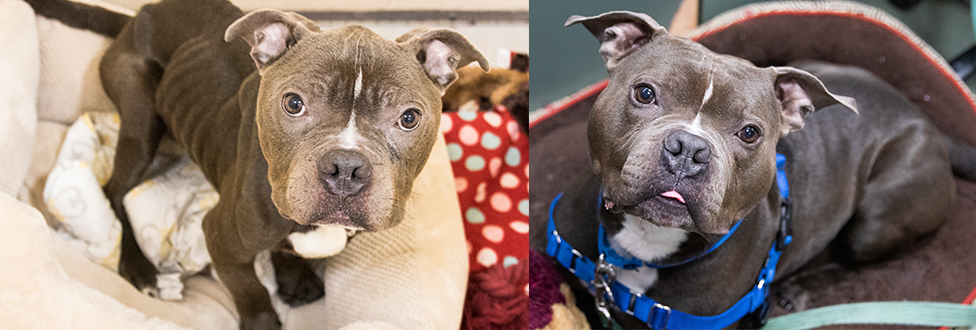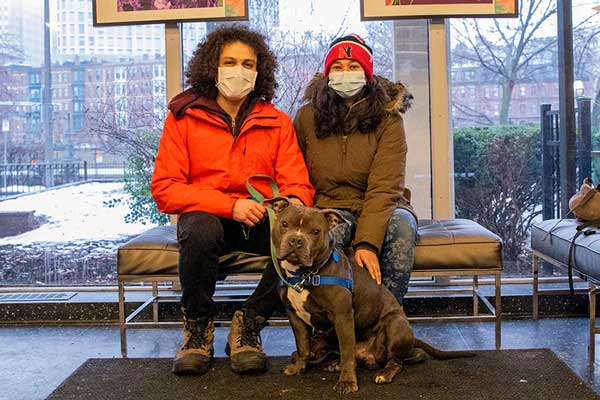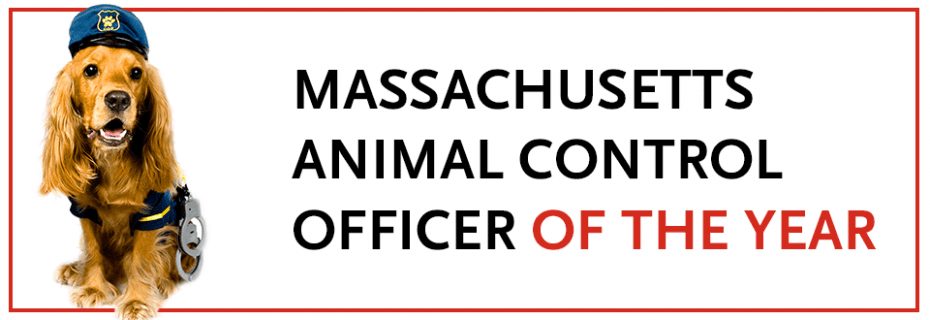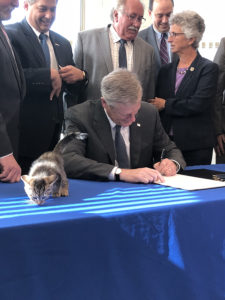ARL Testifies in Favor of 3 Animal-Protection Bills
It was a busy week on Beacon Hill, as a bevy of legislative proposals were heard by numerous committees at the Massachusetts State House, including three animal-protection bills that the Animal Rescue League of Boston (ARL) spoke in favor of.
Nero’s Law
H.2547/S.1606, An Act providing for the care and transportation of police dogs injured in the line of duty (Nero’s Law) was discussed with the Joint Committee on Public Safety and Homeland Security, with ARL and numerous law enforcement agencies throughout the Commonwealth providing testimony.
Nero’s Law was proposed after the tragic death of Yarmouth Police Sgt. Sean Gannon, and the wounding of his K9 partner Nero.
Nero was wounded in the shooting and needed medical attention, however state law currently prohibits the use of ambulances to transporting police dogs.
If passed, the bill would require ambulance services to provide emergency treatment and transport to police dogs.
The bill would require training for EMS in basic level first aid, safe handling procedures, proper decontamination procedures, and sterilization sufficient to prevent allergic reactions for humans.
ARL Director of Law Enforcement Joe King, a former K9 handler and commander with the Massachusetts State Police provided testimony for the committee.
“Law enforcement relies on these dogs to keep us safe,” King said. “They’re the first to make contact with dangerous criminals and I cannot quantify the lives saved because of K9’s who fearlessly go into a situation first. They keep us safe so it’s up to us to do the right thing for them, they deserve whatever resources are available to keep them safe.”
Nero’s Law is co-sponsored by Representative Steven Xiarhos, a retired Yarmouth Police Deputy Chief, and Senator Mark Montigny, a staunch supporter of animal protection law.
“Prior to serving in the Legislature, I spent 40 years on the Yarmouth Police Department and served as the Deputy Chief. On April 12, 2018, I sent a team of highly trained officers on a mission to find and arrest an armed and violent career-criminal, Representative Xiarhos stated. “Three hours later, I learned that my Sergeant, Sean M. Gannon, had been murdered and our K9 Nero was shot in the face. I will never forget the sight of K9 Nero being carried out, covered in blood, and gasping for air. Despite the paramedics present wanting to help save him, they could not legally touch K9 Nero as current Massachusetts law prohibits helping a police animal wounded in the line of duty. It is our duty to protect those who protect us. Their lives matter.”
“These incredible animals risk their lives to work alongside law enforcement in dangerous situations. It is only humane to allow for them to be transported in a way that reflects their contributions to our Commonwealth,” said Senator Montigny. “Sergeant Gannon was a native son of New Bedford and therefore his K9 partner Nero is part of our community’s extended family. We hope that this never has to be used, but it demonstrates the respect for the crucial work these animals do.”
Ollie’s Law
H.305, An Act to regulate pet daycare facilities in cities and towns, dubbed Ollie’s Law, was discussed this week in the Joint Committee on Consumer Protection and Professional Licensure.
This bill is in honor of Ollie, a labradoodle who died at a doggy daycare facility in Western Massachusetts. Ollie was injured in a fight and died as a result of the injuries. There was a veterinarian next door, however there was also just one staff member working at the daycare facility.
If passed, the bill would require commercial boarding or training kennels to be licensed through the Massachusetts Department of Agricultural Resources (MDAR), similar to the current process for animal shelters and pet shops.
Additionally, MDAR would be required to create regulations for: staff to dog ratios, group sizes and supervision, minimum housing and care, indoor and outdoor physical facilities, dog handling, insurance, fire and emergency planning, as well as penalties for non-compliance.
MDAR would also be responsible for regulations regarding staff training, a state-wide reporting system of injuries to dogs or people, among others.
Currently there are no standards or regulations for boarding and training facilities, leaving pet owners the responsibility of doing their research and advocating on behalf of their pet to determine where they should be boarded.
Because there are currently not state-wide regulations for these facilities, ARL created the Kennel-9, a pet safety guide, giving pet owners nine things they should consider before choosing a boarding kennel or daycare facility.
To download the Kennel-9 guide, click here!
ARL has advocated for such regulations in the past and Director of Advocacy Allison Blanck continued these efforts this week.
“Boarding and daycare kennels are unique environments where dogs from different homes interact without their owners,” Blanck stated. “Many of these facilities are well-run and provide necessary socialization and care for dogs. However, the lack of even basic standards means consumers are tasked with both deciding what basic standards are and examining facilities to see if they meet them. A statewide regulatory system would provide confidence to consumers. As we see people return to the office, to travel, and back to their routines, the increased number of families who acquired a pet over the past year are going to be looking for a place to keep their animals. It’s imperative that the Commonwealth act to make sure that all these facilities are adequate.”
Many legislatures are also in favor of such regulations.
“Pet daycare facilities are one of the few industries in the Commonwealth that are unregulated. There is no license needed from the town or state and no baseline requirements for owners or employees,” said bill sponsor Rep. Brian Ashe. “All of us who own pets understand they are full-fledged members of our families and we want to keep them safe. Many pet owners assume this industry is regulated and employees are trained or have experience, but that is not the case. This bill will implement common sense, practical regulations that will provide a base line for businesses to keep the dogs and their employees safe.”
Declawing
This week, the Joint Committee on Consumer Protection and Professional Licensure also heard testimony for S.222, An Act prohibiting inhumane feline declawing.
This bill, sponsored by Senator Montigny, would prohibit the practice of declawing a cat, unless for the therapeutic purposes, defined as limited medical reasons for the cat’s health.
It would not allow declawing based on behavioral concerns, medical concerns of the owner or concerns of the cat being surrendered.
“Many people who have declawed their cat simply don’t realize the pain it causes. Declawing is a horrific procedure that inflicts harm and often leads to other behavioral issues. This bill will help educate the public and ban this cruel practice. No one who values furniture or material goods over the health and wellbeing of an animal should be a pet owner, and I will continue to advocate for these innocent creatures,” said Senator Montigny.
Advocate for Animals in Massachusetts
While formal hearings have already been held for the aforementioned bills, it’s not too late to ask your legislators to support these proposed laws!
Find your legislator here: https://malegislature.gov/Search/FindMyLegislator
The bills ARL provided testimony for are a small sampling of the animal protection bills currently in front of the legislature.
To learn more about ARL’s Legislative Agenda click here!






